Climate Change Escalates Global Wildfire Risks: New Report
A new report reveals human-caused climate change has increased the likelihood of wildfires in South America's Amazon rainforests by at least 20 times. Highlighting significant fire events from March 2023 to February 2024, the report links extreme wildfires in Canada, Greece, and Hawaii to climate change, with global carbon emissions from wildfires up by 16 percent.

- Country:
- India
Human-caused climate change has made wildfires in South America's Amazon rainforests at least 20 times more likely, according to a comprehensive review that evaluated fire activity globally. The report identified extreme fire events from March 2023 to February 2024.
Some of the most notable events included record-breaking wildfires in Canada, the largest recorded wildfire in Greece in July 2023, and drought-driven fires in the Amazon from September to November 2023 and from January to February 2024. Researchers also analyzed deadly fires in Hawaii in August 2023 and in Chile in February 2024.
Published in Earth System Science Data, the State of Wildfires report found forest fires in Canada and Greece were made at least three times and twice as likely, respectively, by climate change. An international team of researchers from the UK and Brazil noted that global carbon emissions from wildfires were 16 percent above average, totaling 8.6 billion tonnes of carbon dioxide.
The researchers stressed that air quality in the Amazon region has become among the worst on the planet. Emissions due to forest fires in Canada were over nine times the average of the past two decades, contributing to nearly a quarter of the global emissions.
Loss of carbon from the tropical rainforests of the Amazon and the far-northern forests of Canada could have lasting implications for Earth's climate, as forests take decades to centuries to recover from such disturbances. Extreme fire years, like 2023-24, may therefore result in a long-term deficit in carbon storage, the researchers warned.
Matthew Jones, a research fellow at the University of East Anglia and one of the corresponding authors, explained that wildfires are becoming more frequent and intense as climate warms, causing both societal and environmental suffering.
Focusing on wildfires in Canada, the Amazon, and Greece, the researchers highlighted that hot, dry conditions promoting fires have intensified significantly due to climate change. In particular, the likelihood of high fire weather in Canada has increased 2.9 to 3.6 times, while in Amazonia it has surged by 20 to 28.5 times.
Francesca Di Giuseppe, a senior scientist at the European Centre for Medium-Range Weather Forecasts, noted that a mix of severe fire weather and abundant dry vegetation caused a significant rise in the number and extent of fires last year.
Agricultural activities also contributed to the increased scope of the 2023 wildfires in the Amazon, exacerbating the vulnerability of forests to fire during periods of drought and fire weather, according to the study's authors.
(With inputs from agencies.)
ALSO READ
China Deplores Canada's Tariffs on Electric Vehicles and Metals
Canada Condemns Arrest Warrant Against Venezuelan Opposition Leader
AP Dhillon Assures Fans After Shooting Incident Outside Canada Home
Climate Change Strains Canada's Insurance Adjusters Amid Rising Catastrophic Events
Canada Tightens Visa Approvals Amid Rising Rejection Rates










